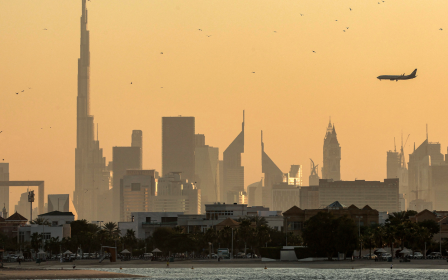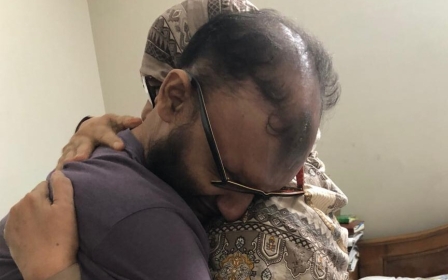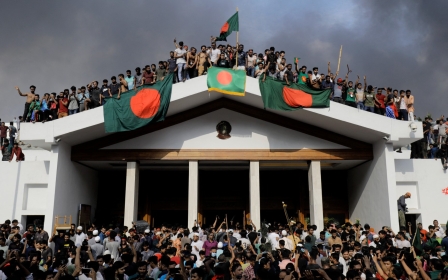Bangladesh's Muhammad Yunus seeking release of protesters in UAE
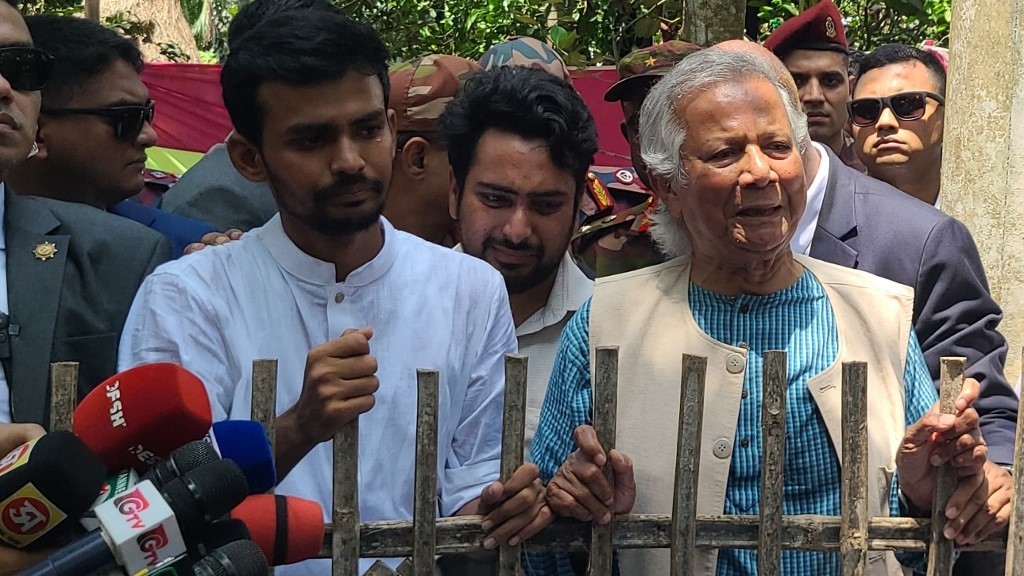
Bangladesh's interim government has hired a lawyer to work on the release of 57 Bangladeshis imprisoned in the United Arab Emirates after protesting against the rule of Sheikh Hasina.
Local media said Bangladesh's embassy had instructed Bangladeshi lawyer Wolora Afrin Rasna on Monday to support the jailed protesters, who marched on 22 July in Abu Dhabi, Dubai and Sharjah against the former Bangladeshi prime minister in response to her government's crackdown on student-led demonstrations.
Under severe popular pressure, Hasina resigned and 5 August and fled Bangladesh.
Speaking at a press conference on Sunday, the interim government's foreign affairs adviser, Touhid Hossain, said Muhammad Yunus, a Nobel laureate who has stepped in to lead Bangladesh through the political transition as "chief advisor", had vowed to free the Bangladeshis detained in the UAE.
"The chief adviser in an informal meeting of the council of advisers today said that he would personally contact the UAE's higher authorities for the release of all Bangladeshi expatriates arrested and sentenced there for demonstrations in support of the student protests in Bangladesh," Hossain told reporters.
New MEE newsletter: Jerusalem Dispatch
Sign up to get the latest insights and analysis on Israel-Palestine, alongside Turkey Unpacked and other MEE newsletters
"If needed, the chief adviser himself shall talk to the concerned government."
Afrin said on her Facebook page that the Bangladeshi embassy had instructed her to work on the case.
"When these workers were arrested, they were sentenced to prison within two days," said Afrin.
"The charges against the men are very serious and one of the main ways these men can be freed is through diplomacy at a high level."
A welcome announcement
The Foundation for Law and Development (Flood), a collective of lawyers in Bangladesh that has been working to free the detained protesters, welcomed the interim government's announcement.
"It is reassuring that they are taking this issue so seriously," said Maruful Alam, a member of Flood and barrister in Bangladesh's Supreme Court.
"The problem we are facing is that we do not know the names of the Bangladeshis sent to jail and whether they had any legal representation or support from the Bangladeshi embassy in the UAE."
"But since holding a press conference, we have begun to receive messages from concerned family members who have relatives imprisoned in the UAE," he added.
"Most workers who travel to the UAE come from rural areas where they might not have a high level of education or aware of what rules they have to abide by in the UAE."
Alam said Flood was ready to support the interim government and added that he was working with a team of prominent Bangladeshi lawyers led by Fawzia Karim Firoze and including Shajib Mahmood Alam and Zakia Akhter.
Last month, the Abu Dhabi Federal Court of Appeal gave three of the protesters life sentences, with 53 others handed 10 years in prison.
The convicted will be deported to Bangladesh at the end of their sentences, according to Emirati news agency WAM.
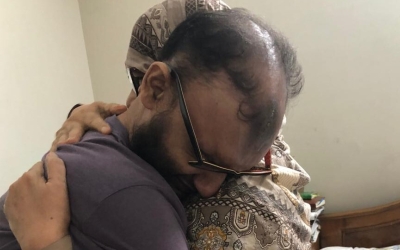
The demonstrators were protesting against a Bangladesh High Court verdict that was set to reintroduce a quota system in the country, reserving 30 percent of government jobs for the descendants of veterans who fought in the country's independence war in 1971.
Mass protests against the quota system, led by students who believed the move to be anti-meritocratic, were violently cracked down on by authorities in Bangladesh.
Unauthorised protests are banned in UAE, a country where freedom of expression is severely restricted.
Anwar Gargash, adviser to the UAE presidency, said: "The Attorney General's decision to refer the protesters to trial is within the legal framework to maintain the state model and prevent the export of other countries' problems to the UAE."
The demonstrators were charged with deliberately disrupting transportation, inciting protests, rioting, causing damage to property and sharing content about the demonstrations online, according to WAM.
Bangladeshis reportedly make up about seven percent of the UAE's population. They are the third-largest immigrant community in the Emirates, after Indians and Pakistanis.
The vast majority of the UAE's population of 9.2 million is made up of migrants, with only around 10 percent being Emirati citizens.
Middle East Eye delivers independent and unrivalled coverage and analysis of the Middle East, North Africa and beyond. To learn more about republishing this content and the associated fees, please fill out this form. More about MEE can be found here.


